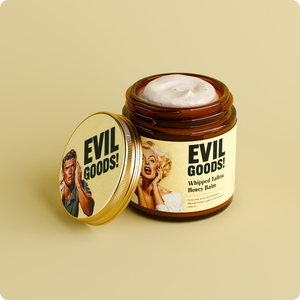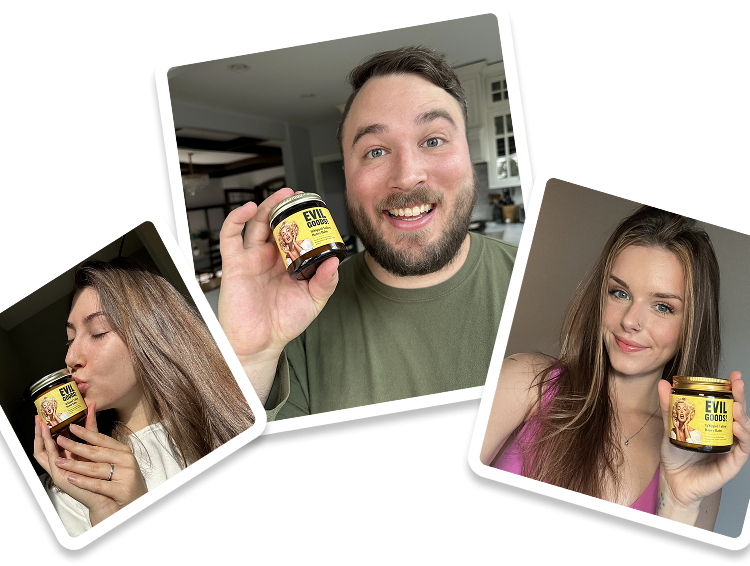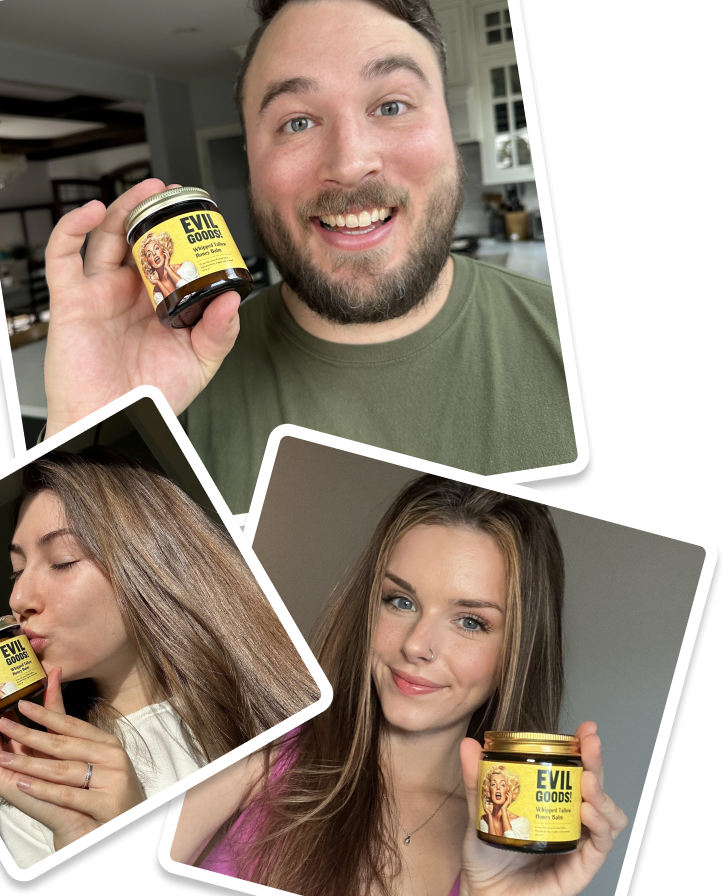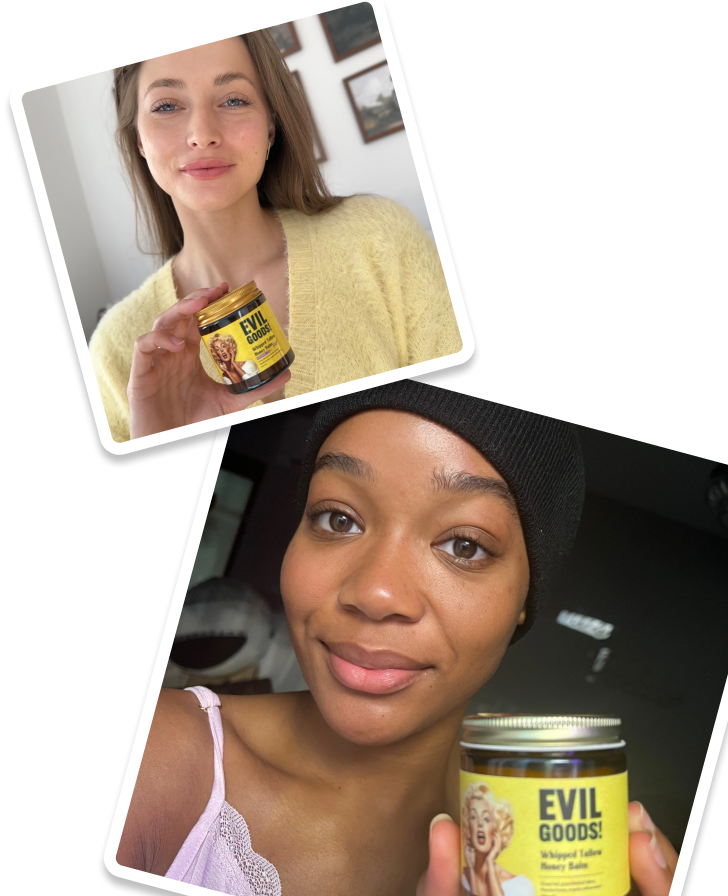Manuka honey stands out from regular honey for one major reason: its strong antibacterial activity. This unique, natural honey is mainly sourced from the nectar of the manuka bush (Leptospermum scoparium).
Unlike regular honey, manuka honey has a potent antibacterial profile, due to its compound methylglyoxal (MGO) and the Unique Manuka Factor (UMF) grading system that proves its authenticity and strength.
If you’ve ever thought, 'What is manuka honey good for?', you’re about to find out. Manuka honey’s uses and benefits, which include wound healing, skincare, and digestive health, are backed by both science and tradition alike.
At Evil Goods, we harness this power in our clean, effective skincare line to deliver real results without the fluff.

What Is Manuka Honey?
Manuka honey is a monofloral honey produced by bees that collect nectar from the manuka bush, a shrub that’s native to New Zealand and Australia.
This type of honey is chemically different from regular honey because of its natural compounds that give it extra health effects, especially for fighting bacteria. It has high levels of methylglyoxal (MGO), a naturally occurring compound responsible for its strong antibacterial activity.
Unsure if what you’ve got is real manuka honey? The Unique Manuka Factor (UMF) grading system measures the concentration of MGO, leptosperin, and dihydroxyacetone (DHA), which together prove genuine manuka honey and show its strength.
The UMF rating is the most trusted standard for honey, with ratings starting at UMF 5+ and therapeutic benefits usually seen at UMF 10+ and above.
Australian manuka honey also follows strict quality standards regulated by the Australian Manuka Honey Association (AMHA), ensuring the honey meets specific rules for purity and active compounds.
Watch out for fake or diluted products; authentic manuka honey always shows its UMF or MGO rating and is produced by certified honey producers in New Zealand or Australia.
Uses of Manuka Honey
Skincare & Acne
Manuka honey is the best option for skin health. Its antibacterial and anti-inflammatory powers fight acne-causing bacteria, soothe eczema, and calm psoriasis flare-ups. It moisturizes deeply, helps skin heal, and reduces redness and irritation.
Using raw manuka honey on skin or products with genuine manuka honey, like our natural face moisturizers and natural body lotions, can improve skin clarity and texture while caring for sensitive or acne-prone skin.
Wound Care & Burns
Manuka honey’s wound healing properties have been well known and used since ancient times, and modern science now backs them up. This honey keeps wounds moist, supports the growth of new tissue, and cleans wounds naturally.
Medical-grade manuka honey is used in wound dressings for burns, diabetic ulcers, and chronic wounds. Its antibacterial activity, which includes fighting antibiotic-resistant infections like MRSA, makes it great for preventing infection and speeding up the healing process.
Cold/Flu & Sore Throat
Taking manuka honey can soothe sore throats and reduce coughs. Its antiviral and antibacterial powers help fight upper respiratory infections by coating irritated tissues and lowering inflammation. Some research shows manuka honey can be as effective as over-the-counter cough treatments, making it a natural choice during cold and flu season.
Digestive & Oral Health
Manuka honey may help with digestive problems like gastric ulcers and irritable bowel syndrome (IBS) by stopping harmful bacteria like Helicobacter pylori and lowering gut inflammation. It also helps maintain oral health by preventing plaque and periodontal disease, keeping gums healthy, and freshening breath.
Other Uses
New studies suggest that nebulized manuka honey (honey that’s been turned into a mist form) may help improve lung health in individuals with cystic fibrosis and provide antioxidants that improve the immune system. While more research is needed, its strong antibacterial and anti-inflammatory effects are evident for many health uses.
Why Manuka Honey Works
Manuka honey’s benefits come from its unique chemicals:
-
Antibacterial and Antifungal Activity: The methylglyoxal (MGO) in manuka honey fights bacteria like MRSA and Pseudomonas aeruginosa. Its antibacterial effect is non-peroxide based, which means it remains active even when diluted or warmed.
-
Anti-inflammatory and Antioxidant Properties: Manuka honey lowers inflammation and fights free radicals. This helps calm irritated skin and supports the immune system.
-
Skin Repair and Moisture: It keeps wounds moist, helps new tissue grow, and speeds healing by encouraging skin cells to regenerate.
-
Oral and Digestive Health: Manuka honey stops plaque, fights gum disease, and soothes stomach ulcers by reducing Helicobacter pylori bacteria.
- Cold and Sore Throat Relief: It coats and soothes the throat while fighting infection, often working like common cough medicines, without chemical additives.

How Manuka Honey Works Differently from Regular Honey
Manuka honey has unique features. Here’s some of them:
-
Source of Nectar: Manuka honey comes mainly from the manuka bush flowers, while regular honey comes from many types of flowers.
-
Unique Compounds: Manuka honey contains methylglyoxal (MGO), leptosperin, and dihydroxyacetone (DHA), which regular honey lacks or has in very low amounts.
-
Antibacterial Strength: Regular honey’s antibacterial activity mostly comes from hydrogen peroxide, which breaks down quickly. Manuka honey’s non-peroxide antibacterial activity stays stable and strong.
-
Grading Systems: Manuka honey uses UMF or MGO ratings to indicate its potency. Regular honey has no such grading.
-
Health Benefits: Manuka honey provides targeted healing and immune support that surpasses the benefits of regular honey.
Manuka Honey Tips You Need to Know
- Choosing Genuine Manuka Honey: Look for one of two key certification marks, depending on the country of origin. If you’re purchasing honey from New Zealand, look for the UMF™ (Unique Manuka Factor) trademark with a rating of 10+ or higher. For honey from Australia, look for the AMHA (Australian Manuka Honey Association) mark of authenticity on the label.
- How to Use: Take a spoonful daily, adding it to tea or warm liquids only after they have cooled to a drinkable temperature (ideally below 40°C or 104°F) to preserve its natural enzymes and other beneficial compounds. Alternatively, drizzle it over food. For skin, you can apply raw manuka honey as a mask or spot treatment, but always patch test first. You can also purchase products with manuka honey, such as our lotions and natural face moisturizers.
- Storage and Shelf Life: Manuka honey lasts for years if you store it in a cool, dry place away from sunlight.
- Cautions: Do not give manuka honey to babies under one year. If you have allergies to bees or honey or have diabetes, talk to a healthcare professional before use.

How Bees and Manuka Plants Make Manuka Honey
The process behind manuka honey is as fascinating as its benefits:
-
Bees Collect Nectar: Bees collect nectar from manuka flowers, which only bloom for a short period each year, collecting nectar rich in valuable nutrients.
-
Honey Production: Bees convert the nectar to honey through enzymatic activity in the beehive.
-
Harvest and Testing: Beekeepers carefully harvest the honey and test it for UMF, MGO, and other markers to confirm purity and authenticity.
-
Raw Manuka Honey: The honey is minimally processed, so it keeps all its natural compounds intact.
Comparing Raw Honey, Manuka Honey, and Orange Blossom Honey
Raw Honey: This type of honey hasn’t been heat-treated or highly processed, retaining natural enzymes and nutrients. Raw honey might come from numerous types of flowers, but it doesn’t have the unique compounds found in manuka honey.
New Zealand Manuka Honey: Produced from the nectar in the flowers of the manuka tree in New Zealand, this honey is prized for its high UMF value and potent antibacterial properties.
Orange Blossom Honey: Harvested from the flowers found on orange trees, this honey is milder in flavor and lower in antibacterial strength than manuka honey. It's used as a natural sweetener, but not for the same medicinal use.
Medical Grade Honey: Sterilized and standardized special honey, most often manuka, used in medical settings to heal wounds due to its proven healing ability.

Frequently Asked Questions
What Is Manuka Honey Good For?
Manuka honey is good for healing wounds, treating skin conditions like acne and eczema, and soothing sore throats. It also supports gut and oral health and fights infections, including antibiotic-resistant bacteria. Its unique antibacterial and anti-inflammatory properties make it more potent than regular honey.
How Do I Choose the Best Manuka Honey?
Look for a UMF rating of 10+ or higher on the label. Check for certification from the UMF honey association or the Australian Manuka Honey Association. Authentic manuka honey will clearly list its UMF or MGO rating.
Can Manuka Honey Treat Acne?
Yes, manuka honey’s antibacterial and anti-inflammatory effects help reduce acne-causing bacteria and calm skin inflammation. Applying raw manuka honey or using manuka-infused skincare products, such as our natural face moisturizers, can improve acne and soothe irritated skin.
How Much Manuka Honey Should I Take Daily?
We recommend one to two teaspoons daily for general health benefits. For specific conditions, talk to a healthcare professional before increasing intake.
Is Manuka Honey Worth the Price?
Manuka honey’s unique bioactive compounds and proven health benefits justify its higher cost. It offers potent antibacterial, anti-inflammatory, and healing properties that regular honey cannot match.
Manuka-Infused Skincare: Zero Toxins, Zero Fluff
At Evil Goods, we use high-UMF manuka honey and grass-fed beef tallow for the biggest skincare benefits. Our products are made by skincare experts who specialize in natural and effective ingredients.
We ensure zero toxins, zero additives in our products, which means you won’t find parabens, phthalates, seed oils, or synthetic fragrances in anything we produce.
Customers love how our products deeply hydrate and calm redness. Our Manuka All-in-One Healing Balm gently cleanses with antibacterial properties, making it perfect for acne-prone skin. Additionally, it helps restore dry patches and soothe minor irritations.
Check out our full organic lotion skincare collection to see the difference manuka honey can make.
Last Thoughts on Manuka Honey
Manuka honey is a powerful, natural remedy with proven benefits for wound healing, skin health, immune support, and more. Choosing real manuka honey with a high UMF rating ensures you get the full range of beneficial compounds.
Ready to experience manuka honey’s benefits? Explore our manuka-infused beef tallow skincare products for effective products that deliver real results.
References
1. New Research Shows High Abundance of Leptosperin In Australian Manuka Honeys, 2022, Australian Manuka Honey Association (AMHA).
2. Antibacterial activity of Manuka honey and its components: An overview, 27/11/2018, National Library of Medicine/National Center for Biotechnology Information.
3. Chronic Wound Management; Surgical Therapy and Complementary Nursing with Manuka Honey, 2021, Journal of Mind and Medical Sciences.

Dr. Elena Dinkollari
MD, Dermatologist & Endocrinology Assistant
Doctor Approved








